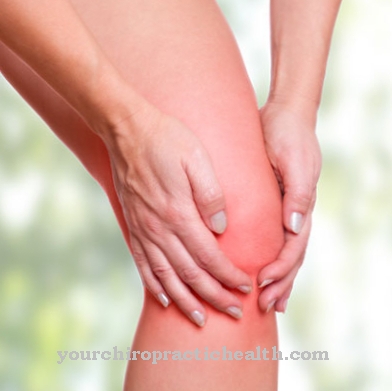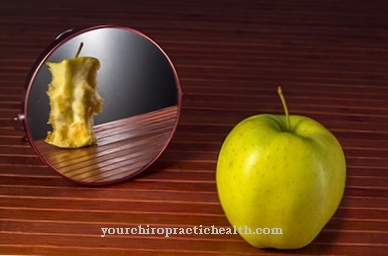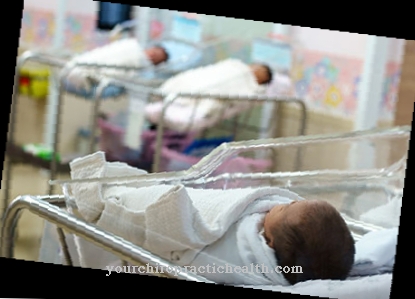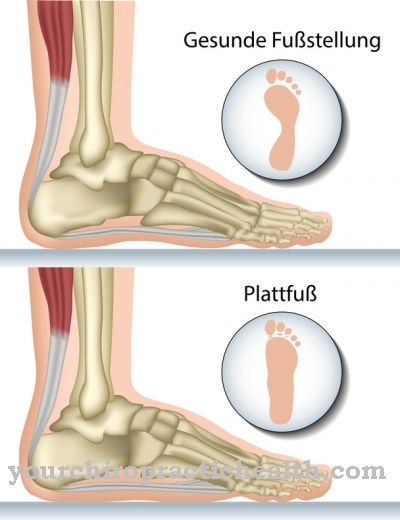Mosquito bites are mostly just a nuisance in Germany. However, reports of severe allergic reactions have been increasing recently. In more southern regions, especially in South America and Africa, mosquitoes can transmit serious to fatal diseases.
What is a mosquito bite?

There are numerous types of mosquitoes that can be found almost all over the world. Only the polar regions and some deserts are completely free of them. The mosquito bite is carried out exclusively by female animals, as proteins of the blood are necessary to allow the fertilized eggs to grow.
On closer inspection, the term "stitch" is not entirely correct. A mosquito has a proboscis to drink blood - it's not a stinger. Instead, they use different mouthparts to suck blood.
Mainly the piercing bristles are used, which have two channels inside. One injects the insect's saliva into the skin, while the other is used to suckle blood. Saliva injection serves several purposes. First, the host's blood clotting is prevented so that the blood meal can be sufficiently rich.
Second, chemicals are also released into the puncture site that suppress the itching first. The "victim" should not notice anything about the sting. Subsequently, it is precisely these substances that lead to swelling and itching through an intolerance reaction.
causes
Mosquitoes are able to transmit diseases to humans. These include parasitic (malaria, filariasis and leishmaniasis), viral (including yellow fever, dengue fever) and bacterial diseases (tularemia). A disease can only be transmitted if the insect has also been infected via an infected host.
The time from ingestion of the pathogen by a mosquito and the possibility of passing it on through the saliva is known as the extrinsic incubation period. Before this time has elapsed, the infection cannot be passed on to another living being.
Symptoms, ailments & signs
Overall, the symptoms of a mosquito bite are very clear. A distinction must be made between the normal symptoms of any mosquito bite and the symptoms of an allergic reaction to it. Every mosquito bite can be perceived as a bite as long as the person concerned is awake.
The feeling corresponds roughly to that of a small needle prick, but the prick only hurts at the moment of the puncture. The puncture site is usually small and quickly begins to itch. In most cases there is no pain, only the itching. The itching is also noticeable after waking up - if the mosquito bite occurred while sleeping. The reddening of the skin from a mosquito bite is localized.
The itching and redness can be increased by scratching. The same applies to any swelling that has occurred. In the event of an allergic reaction to certain substances in the mosquito's saliva, a more extensive skin reaction can occur. This leads to spreading redness, wheals, severe itching and swelling. These symptoms can vary in severity.
In severe cases, there are circulatory problems and corresponding weakness. The puncture site itself becomes particularly warm and swells enormously. Most of the time, a hardening - similar to a scar - remains after the symptoms have subsided.
Diagnosis & course
If unusual symptoms occur after a trip to tropical regions, a mosquito-borne illness should always be considered.
In malaria, the incubation period can be up to 4 weeks. The symptoms of the Anopheles mosquito-borne infection are similar to those of the flu.
In contrast to yellow fever, which is noticeable after 3 to 6 days, in malaria the connection to the trip can often no longer be established. Depending on the cause, the various clinical pictures are diagnosed in different ways.
Yellow fever is usually diagnosed clinically, while an examination of the blood for antibodies is crucial for sand fly fever.
In skin leishmaniasis, which is triggered by parasites of the genus Leishmania, those affected show typical skin changes in some forms. A biopsy can support the diagnosis, whereby boat-shaped leishmanias can be seen in the specimen.
Complications
Mosquito bites usually heal quickly. In rare cases, however, complications can arise. Complications are possible, among other things, from a violent allergic reaction of the body to the proteins injected by the mosquito when it bites. As with all other insect bites, it can lead to huge swellings accompanied by a fever or even to anaphylactic shock.
However, complications resulting from the behavior of the stung people are also possible. Since a very itchy reddish wheal always forms on the affected area, attempts are often made to relieve the unbearable itching by scratching. This results in skin injuries that can serve as entry points for various bacterial pathogens.
Streptococci can get into the lymphatic system, multiply there and cause lymphedema. If the germs get into the bloodstream, potentially fatal blood poisoning (sepsis) can develop. It is also dangerous if the mosquitoes inject faecal bacteria such as E. coli bacteria, which they acquire by placing on top of animal faecal waste, into the bloodstream when they bite.
Mosquitoes as carriers of tropical diseases do not yet play a role in Germany. However, travelers to tropical countries should also be vaccinated against tropical pathogens. Otherwise, diseases such as malaria, yellow fever, dengue fever, West Nile fever or chikungunya fever can be transmitted there if a mosquito bites.
When should you go to the doctor?
Normally a doctor is not needed in the event of a mosquito bite. With sufficient cooling or the use of a mosquito ointment, which can be bought over the counter in drugstores or pharmacies, the side effects can be alleviated. In addition, the healing process is positively supported by the use of the preparations, as they minimize the itching.
If people with a weakened immune system or infants suffer from a variety of mosquito bites, a doctor should be consulted. If the side effects are so stressful that severe discomfort, inner restlessness or whiny behavior persist, the help of a doctor is necessary. If there is inflammation or open wounds, sterile wound care is required.
If this cannot be guaranteed to a sufficient extent, a doctor should be consulted, as there is a risk of sepsis. If you have a fever, chills, sweats or pain, a doctor's visit is also necessary. If there is a disturbance of the heart rhythm, severe swelling and an increase in existing complaints, action is required.
Treatment & Therapy
Mosquito bites from northern European areas almost never require medical treatment. In some cases, allergic reactions up to anaphylaxis (allergic shock) can be triggered. A doctor should be consulted if symptoms occur.
An uncomplicated sting is treated with small home remedies, such as onion juice or a disinfecting lotion. This will minimize the likelihood of additional bacterial infection. Despite enormous itching, scratching is not advisable as the symptoms can be exacerbated and there is a risk of inflammation. A cooling gel, which can also be used for burns and other skin irritations, provides a remedy for massive itching.
The more serious communicable diseases, in most cases, absolutely require treatment, otherwise they can lead to death. Many therapies can only alleviate the course of the disease or strengthen the immune system in order to fight the infection.
No cure for malaria has yet been discovered. The drug chloroquine is used for acute attacks. If there is resistance to chloroquine, doxycycline or atovaquone-proguanil are administered for prophylaxis if there is a high risk of malaria. The situation is similar with yellow and dengue fever, as well as leishmaniasis and filariasis. Tularemia, which is often fatal, is treated with antibiotics, with streptomycin being the most effective.
Filariasis caused by roundworms (nematodes) from the group of filariae exists in numerous sub-forms, some of which are well treatable. Mosquitoes transmit microfilariae - microscopic nematodes - via their saliva. It is treated with anthelmintics (drugs against worms), with special drugs being given for adult worms and microfilariae.
Outlook & forecast
The prognosis for a conventional mosquito bite from a harmless mosquito that is not contaminated with pathogens is very good. A mosquito bite usually heals completely within a few days. Neither permanent skin changes nor further medical complications are to be expected. Ointments for healing or suitable home remedies can be used, but are not necessary.
The prognosis is significantly worse if the puncture site has no chance of healing. This is the case, for example, if there is too much scratching or other skin problems are present. In such cases, bacterial inflammation can rarely occur, which then leads to a local infection. Further scratching often makes this condition worse. Even with infected mosquito bites, the prognosis is very good if the infection is detected early and treated quickly. In the case of a local infection, healing is possible within a few days and here, too, no permanent damage is to be feared. The skin regenerates completely.
In contrast, bites by dangerous mosquitoes, for example in the tropics, can lead to infectious diseases that have a poorer prognosis. In malaria, the untreated death rate is around 20 percent, but treated is only two percent. Rapid treatment improves the prognosis. However, it is true that mosquito bites are considered harmless in Central and Northern Europe.
prevention
The best prevention against mosquito bites in general is to wear long-sleeved, dense clothing in problem areas. A repellent spray against mosquitoes or a mosquito net can help. With regard to the serious clinical pictures in tropical areas, information about the infectious diseases there is essential before traveling. Vaccinations are possible against many of the infections described.
Aftercare
Follow-up care for a mosquito bite includes the treatment of the itching that may need to be continued. If this occurs again after a while, the previously tried and tested therapeutic approaches can be applied again. Creams, ointments and gels also soothe the skin and thus promote rapid healing. If the itching has completely subsided, no further follow-up measures are usually required.
The redness and swelling associated with the sting usually go away on its own within a few days. However, to rule out possible complications in healing, this process should be observed. In this way, possible infections caused by scratching can be detected in good time. If the swelling increases or the reddening spreads, a doctor should be consulted.
With the help of a blood test, this can clarify whether the mosquito transmitted bacteria or viruses when it stung. Particular attention is also required in the case of known allergies to insect bites. If such an allergy is present, the treatment initiated in the first step must be continued over a longer period of time after consultation with the responsible doctor. Allergic reactions can also occur at a later point in time and then require treatment as quickly as possible. Allergy sufferers should therefore pay particular attention to changes in the condition of the skin around the bite.
You can do that yourself
As a rule, medical care is not necessary in the event of a mosquito bite. Treatment can be carried out by self-implementable measures. Consultation of a doctor is only recommended in the case of severe allergic reactions - such as those that can occur in contact with insects from tropical regions.
The first measure in the treatment is cooling. This reduces swelling and at the same time alleviates itching. Antipruritic lotions and gels can be purchased in pharmacies and drugstores. There are also special products for children with fewer additives. The onion is a tried and tested home remedy: Placing half of it on the pricked skin relieves itching and swelling. The pure juice of the aloe vera also has a cooling effect. At the same time, it cares for the irritated skin. A hot spoon on the wound also reduces the itching, as the protein in the mosquito poison is precipitated by the heat.
But the most effective is prevention.We recommend mosquito nets on windows and doors, avoiding standing water, avoiding very strongly scented perfumes and showering in the morning and evening, as the smell of sweat is attractive to mosquitoes. Pharmacies offer numerous sprays and lotions containing mosquito repellants. Care should be taken when using it for children and allergy sufferers. If in doubt, a doctor or pharmacist should be consulted.






.jpg)




















